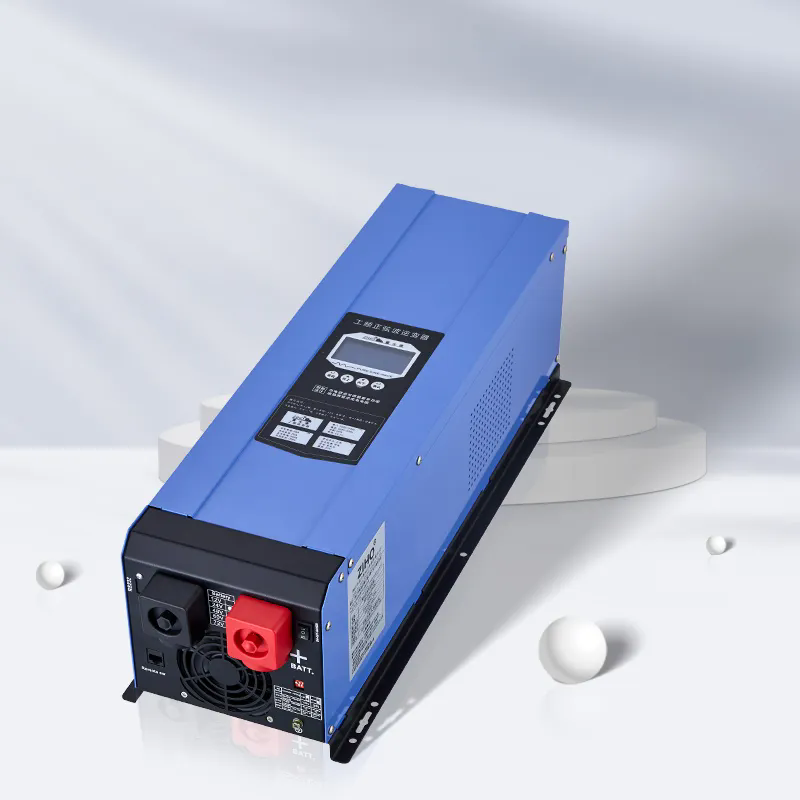What Are Off-Grid Inverters and How Do They Benefit Your Energy System?
2024-11-12
In the world of renewable energy, off-grid systems are becoming increasingly popular for those who want independence from the traditional power grid. Off-grid inverters are an essential component in these systems, playing a key role in the conversion and management of energy. But what exactly are off-grid inverters, and why should you consider them for your energy needs? In this blog, we’ll explore the functionality, benefits, and applications of off-grid inverters.
What Is an Off-Grid Inverter?
An off-grid inverter is a device that converts direct current (DC) electricity from renewable sources like solar panels or wind turbines into alternating current (AC) electricity, which can be used to power your household appliances, lights, and other electronic devices. The key difference between off-grid inverters and grid-tied inverters is that off-grid inverters are designed for standalone energy systems, without reliance on the main electrical grid.
In an off-grid system, energy storage is typically handled by batteries, which store the excess energy produced by your renewable system for later use. The off-grid inverter manages this energy by converting DC from the batteries into AC power, ensuring that you can use the energy when you need it, even at night or during periods of low renewable energy production.
How Do Off-Grid Inverters Work?
The primary function of an off-grid inverter is to manage the conversion of DC to AC power and distribute it to your appliances. Here’s a breakdown of the process:
1. Energy Generation: Solar panels, wind turbines, or other renewable energy sources generate DC electricity.
2. Energy Storage: The DC electricity is stored in batteries for use when production is low, such as during the night or cloudy days.
3. Conversion: When energy is needed, the off-grid inverter takes the stored DC power and converts it into AC power, making it compatible with your household appliances.
4. Power Distribution: The converted AC power is then distributed to your home, providing electricity for your lights, devices, and other needs.
In addition to converting power, off-grid inverters often come with built-in features for managing battery charging, system monitoring, and optimizing energy use.
Why Choose an Off-Grid Inverter?
There are several advantages to using off-grid inverters, especially if you live in a remote area or are looking to reduce your dependence on the traditional power grid.
1. Energy Independence: The most obvious benefit of using an off-grid inverter is that it allows you to generate and use your own power. You are no longer reliant on utility companies, which is especially important for those in remote locations or in areas with unreliable electricity supply.
2. Sustainability: Off-grid inverters are typically used in renewable energy systems like solar or wind power, which are environmentally friendly. By using clean energy sources, you can reduce your carbon footprint and contribute to a more sustainable future.
3. Cost Savings: While the initial investment for setting up an off-grid system can be significant, it can save money in the long run. With an off-grid inverter, you reduce or eliminate electricity bills, as you generate your own power. Additionally, many off-grid systems are eligible for tax incentives or rebates, making them a more cost-effective choice over time.
4. Backup Power: For people living in areas prone to power outages, an off-grid inverter can act as a backup system. Even if the grid goes down, your renewable energy system, combined with an off-grid inverter, ensures that you still have power.
5. Scalability and Flexibility: Off-grid systems are highly scalable. You can start small and gradually add more panels or wind turbines, batteries, or inverters as your energy needs grow. This flexibility makes off-grid systems a great choice for both small homes and larger, more complex setups.
Types of Off-Grid Inverters
Off-grid inverters come in different types to suit various applications, and selecting the right one depends on your energy needs and the type of renewable system you use.
1. Pure Sine Wave Inverters: These are the most common and efficient type of off-grid inverter. They produce clean, stable AC power that is compatible with all types of electrical appliances, including sensitive electronics like computers and medical equipment.
2. Modified Sine Wave Inverters: These are more affordable but less efficient than pure sine wave inverters. They may not be suitable for sensitive electronics but work fine for basic appliances such as lights, fans, and power tools.
3. Hybrid Inverters: Hybrid inverters combine both off-grid and grid-tied features, allowing for seamless switching between battery power, renewable energy sources, and grid power. They offer the flexibility of grid connection while providing backup energy when needed.
4. String Inverters vs. Microinverters: String inverters work with a series of panels in a string, converting DC power from all panels in the series at once. Microinverters, on the other hand, are installed on each individual panel, offering greater efficiency and better performance in areas with shading or variable sunlight.
Applications of Off-Grid Inverters
Off-grid inverters are ideal for a variety of applications, including:
- Remote Homes: For people living off the grid, an off-grid inverter provides a reliable and independent power source.
- Cabins or Cottages: If you own a vacation home or cabin in a remote area, an off-grid inverter system can ensure you always have electricity without the need to be connected to the grid.
- Recreational Vehicles (RVs): Off-grid inverters can be installed in RVs, ensuring that you have power while traveling or camping in remote locations.
- Emergency Preparedness: In areas that experience frequent power outages, an off-grid inverter can provide backup power during emergencies.
Conclusion
Off-grid inverters are essential components in renewable energy systems, allowing users to generate and use their own electricity independently from the grid. Whether you live in a remote area, want to reduce your environmental impact, or are looking for a reliable backup power solution, an off-grid inverter offers a sustainable and cost-effective way to manage your energy needs.
By providing energy independence, sustainability, and cost savings, off-grid inverters play a crucial role in the shift toward more resilient and eco-friendly energy systems. As technology continues to improve, these inverters will only become more efficient and accessible, helping to power a cleaner, more self-sufficient future.



